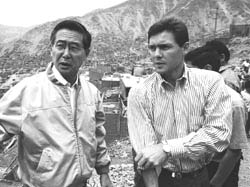
|
Magazine
Fall 1997
Wabash Innocents Abroad
by Tim Padgett '84, Latin America Bureau Chief
Time Magazine
That might sound like heartland schmaltz. But it's as good a rebuttal as any to those who ask what business a small, landlocked college like Wabash has touting itself as a place for international studies. The fact is, Wabash doesn't try to affect the blasé worldliness of America's two coasts. Like Keillor's misty lake, it still encourages its students to indulge a bit of imaginative awe about the world, an unabashed excitement about learning distant peoples and places that I think makes its alumni surprisingly able professionals overseas.
Call it the "Innocents Abroad" factor. From my father, James Padgett '58, who was born in the backwater hamlet of Terhune, Indiana, and became one of the first U.S. businessmen allowed into communist China in the 1970s; to my 1984 classmate Ray Jovanovich, a Hammond, Indiana, native now thriving so impressively in the exotic rambunctiousness of Hong Kong, Wabash men navigate as well as any beyond America's borders. That's because once they're out there, in my opinion, they tend to be all the more enthusiastic about learning the wider world. And that world today, in return, tends to give breaks to Americans who want to learn from it rather than lecture to it.
My own work rarely lets me forget that. The new year started well last January when, during the hostage crisis in Lima, I got the first interview with Peruvian President Alberto Fujimori. A lot of it, per usual in these things, was simply persistence and dumb luck; but I'd like to think that a part of it was due to the fact that my assistant and I convinced the president's aides that we were the major news outlet most interested in relating "Fuji's" side of the controversy, as well as that of the hostage takers. That day Fujimori also gave us an extraordinary and exclusive personal tour of a squalid prison where his government held legions of guerrillas; they were from the same rebel group holding his brother and 71 VIPs hostage across town in the Japanese embassy residence. Fujimori's nose-to-nose confrontation with them through their cell bars was a surrealistic moment forever etched in my memory. It seemed to encapsulate the paradoxical moment Latin America is living today: the region's modern, free-market leader taunting the jaded Che Guevara in his cage; but Che Guevara still heckling right back, because he knows that Fujimori and his ilk haven't even begun to solve the region's chronic social injustices.
Fortunately, I've had other Wabash alumni to inspire me in this game-most of all ABC News correspondent Dean Reynolds '70. During the 1980s and early '90s, few journalists better explained Middle Eastern stories such as the Intifada, and his dispatches have always been one of the standards by which I try to set my coverage in Latin America. In July, Reynolds was here in Mexico to report the historic elections that handed the dictatorial ruling party, the PRI, its first federal defeat since it was founded 68 years ago-and it was more than satisfying to know that the largest network and newsmagazine audiences in America saw that story through the eyes of Wabash graduates.
By the same token, I have to admit that I'm as prone as anyone to become the Ugly American, especially when I find myself in the fifth or sixth Third World airport of the week. Sometimes being the gringo ogre can get you on a plane you need to catch; more often it just makes you look like a jerk. I once let a Guatemalan waitress have it when, after I ordered a refresco, she brought me some gloppy, pungent punch instead of the Coca-Cola I was expecting. It was only later I learned that refresco is the Mexican, not Guatemalan word for soda pop, while in Guatemala the proper term is gaseosa. Moments like that usually shame me into remembering one of my now deceased bosses in Chicago: he always took reporter candidates out to eat so he could watch not whether they used the right fork and knife, but how they treated folks like taxi drivers and waiters. He'd been a journalist long enough to know that being decent to the powerless can get you as many important stories as kissing up to the powerful.
The point, of course, is that ultimately the skills you need to deal with people abroad are more or less the same you need at home (with the possible exception of keeping up with British correspondents in bars). And it works both ways. While in Chicago in 1988 I was sent to Huntington, Indiana, to get the lowdown on Dan Quayle after he'd been nominated for vice president. The morning after all the national media descended on the town, the locals whom we all wanted to interview were in the diner eating biscuits and gravy. I'd grown up with the stuff; but most of the other reporters (many of whom had flown in from New York, Washington, and Los Angeles) had never seen that Midwestern delicacy, and they couldn't even bring themselves to sit down next to it, let alone eat it. I did, and gathered m""ÝCÝt Quayle's yÐ`er days that morning than many of them did the entire week. Lord knows I've had similar experiences in the boonies of Mexico, Nicaragua, and Venezuela. Sure, to have fun and success abroad it might help to acquire a more worldly and sophisticated air. But it's just as useful to bring along the best of what you already are.

